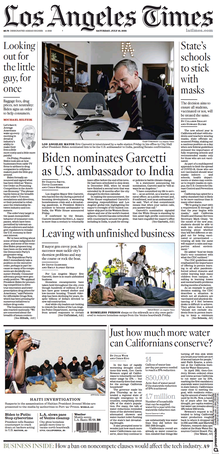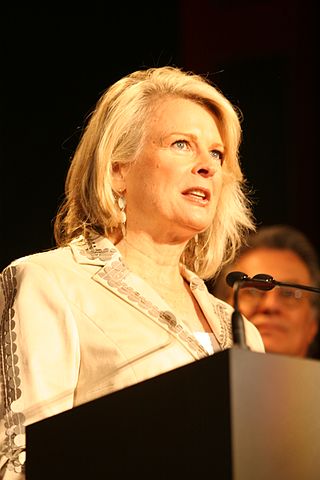
Hollywood Forever Cemetery is a full-service cemetery, funeral home, crematory, and cultural events center which regularly hosts community events such as live music and summer movie screenings. It is one of the oldest cemeteries in Los Angeles, California and is located at 6000 Santa Monica Boulevard in the Los Angeles neighborhood of Hollywood. It was founded in 1899 as Hollywood Cemetery, and, from 1939, was known as Hollywood Memorial Park until 1998 when it was given its current name. The studios of Paramount Pictures are located at the south end of the same block, on 40 acres (16 ha) that were once part of the cemetery which held no interments.

The Los Angeles River, historically known as Paayme Paxaayt by the Tongva and the Porciúncula River by the Spanish, is a major river in Los Angeles County, California. Its headwaters are in the Simi Hills and Santa Susana Mountains, and it flows nearly 51 miles (82 km) from Canoga Park through the San Fernando Valley, Downtown Los Angeles, and the Gateway Cities to its mouth in Long Beach, where it flows into San Pedro Bay. While the river was once free-flowing and frequently flooding, forming alluvial flood plains along its banks, it is currently notable for flowing through a concrete channel on a fixed course, which was built after a series of devastating floods in the early 20th century.

Robert Blake, billed early in his career as Mickey Gubitosi and Bobby Blake, was an American prolific Golden Globe and Emmy Award winning actor, who appeared in some 200 films. He was best known for starring in the 1967 film In Cold Blood and playing the title role in the late 1970s television series Baretta.

The Los Angeles Times, abbreviated as LA Times, is a daily newspaper that started publishing in Los Angeles in 1881. Based in the Los Angeles County city of El Segundo since 2018, it is the sixth-largest newspaper by circulation in the United States, as well as the largest newspaper in the western United States. It has won more than 40 Pulitzer Prizes. It is owned by Patrick Soon-Shiong and published by the Times Mirror Company.The Los Angeles Times is the largest metropolitan daily newspaper in the country, with more than 40 million unique latimes.com visitors monthly, Sunday print readership of 1.6 million and a combined print and online local weekly audience of 4.4 million. The Pulitzer Prize-winning Times has been covering Southern California for more than 141 years.

Candice Patricia Bergen is an American actress. She won five Primetime Emmy Awards and two Golden Globe Awards for her portrayal of the title character on the CBS sitcom Murphy Brown. She is also known for her role as Shirley Schmidt on the ABC drama Boston Legal (2005–2008). In films, Bergen was nominated for the Academy Award for Best Supporting Actress for Starting Over (1979), and for the BAFTA Award for Best Actress in a Supporting Role for Gandhi (1982).

In some schools of Buddhism, bardo or antarābhava is an intermediate, transitional, or liminal state between death and rebirth. The concept arose soon after Gautama Buddha's death, with a number of earlier Buddhist schools accepting the existence of such an intermediate state, while other schools rejected it. The concept of antarābhava, an intervening state between death and rebirth, was brought into Buddhism from the Vedic-Upanishadic philosophical tradition. Later Buddhism expanded the bardo concept to six or more states of consciousness covering every stage of life and death. In Tibetan Buddhism, bardo is the central theme of the Bardo Thodol, the Tibetan Book of the Dead, a text intended to both guide the recently deceased person through the death bardo to gain a better rebirth and also to help their loved ones with the grieving process.

Elizabeth Short, known posthumously as the Black Dahlia, was an American woman found murdered in the Leimert Park neighborhood of Los Angeles, California, on January 15, 1947. Her case became highly publicized owing to the gruesome nature of the crime, which included the mutilation of her corpse, which was bisected at the waist.

Howard Green Duff was an American actor.

George Dyson is an American non-fiction author and historian of technology whose publications broadly cover the evolution of technology in relation to the physical environment and the direction of society. He has written on a wide range of topics, including the history of computing, the development of algorithms and intelligence, communications systems, space exploration, and the design of watercraft.

The Verdugo Mountains, also known as the Verdugo Hills or simply The Verdugos, are a small, rugged mountain range of the Transverse Ranges system in Los Angeles County, California. Located just south of the western San Gabriel Mountains, the Verdugo Mountains region incorporates the cities of Burbank, Glendale, Pasadena, and La Cañada Flintridge; the unincorporated communities of Altadena and La Crescenta-Montrose; as well as the City of Los Angeles neighborhood of Sunland-Tujunga.

Bonny Lee Bakley was the second wife of actor Robert Blake, who was her tenth husband. Bakley was fatally shot while sitting in Blake's parked car outside a Los Angeles restaurant in May 2001.
Charles Royal LeDuff is an American journalist, writer, and media personality. He is the host of the No BS News Hour with Charlie LeDuff. LeDuff was employed by The New York Times for 12 years, then employed by The Detroit News, leaving in October 2010 after two years to join the Detroit Fox affiliate WJBK Channel 2 to do on-air journalism. LeDuff left Fox 2 Detroit on December 1, 2016. LeDuff has won a number of prestigious journalism awards, including a Pulitzer Prize, but has also faced accusations of plagiarism and distortion in his career, to which he has responded.

Benjamin Berkley "Ben" Sherwood is an American writer, journalist, and producer who was formerly the President of Disney-ABC Television Group and ABC News.
Steve Carver was an American film director, producer, and photographer.
The Water Resources Collections and Archives (WRCA), formerly known as the Water Resources Center Archives, is an archive with unpublished manuscript collections and a library with published materials. It was established to collect unique, hard-to-find, technical report materials pertaining to all aspects of water resources and supply in California and the American West. Located on the campus of the University of California Riverside (UCR), it is jointly administered by the UCR College of Natural and Agricultural Sciences (CNAS) and the UCR Libraries. WRCA was part of the University of California Center for Water Resources (WRC) that was established and funded in 1957 by a special act of the California State Legislature and was designated the California Water Research Institute by a federal act in 1964.

The Glendale Narrows is a scenic 11 mile section of the Los Angeles River in the Northeast Los Angeles region of Los Angeles County, California.

Michael Jay Ybarra was an American journalist, author and adventurer whose non-fiction work appeared in various national publications. In 2004, his book about McCarthyism, Washington Gone Crazy: Senator Pat McCarran and the Great American Communist Hunt, won the D.B. Hardeman Prize. As the extreme sports correspondent for The Wall Street Journal, Ybarra wrote articles about outdoor adventure, providing the genre with a wider audience than it typically receives.
Friends of the Los Angeles River (FoLAR) is a 501(c)(3) non-profit organization founded in California in 1986, whose mission is to protect and restore the natural and historic heritage of the Los Angeles River and its riparian habitat. The group was initially founded by area performance artist Lewis MacAdams in conjunction with other artists and architects, following a foot tour of the "latter day urban hell" of the river.

Detroit: An American Autopsy is a 2013 book by Charlie LeDuff, published by Penguin Books. In the book LeDuff discusses the present state of Detroit and its economic, social, crime, and political issues.

Guashna was a Tongva village located at Playa Vista, Los Angeles at the mouth of Ballona Creek. The site has also been referred to as Sa'angna, with various sources debating whether Sa'angna, meaning "place of tar," was a regional referent rather than a village name or whether it was a separate nearby village. The initial place name was said to be Sa'an; the village suffix "ngna" was added by Bernice Johnston to her 1962 map of Gabrieleño villages "despite her having found no mention of the term in baptismal records." Sa'angna is also not to be confused with Suangna. The Tongva referred to the Ballona Wetlands as Pwinukipar, meaning "full of water." Another alternate name may Waachnga.
















